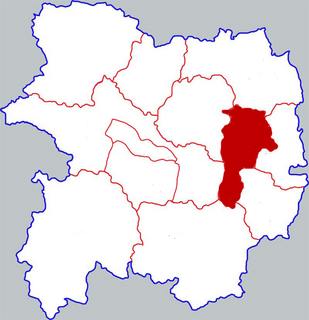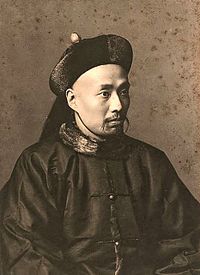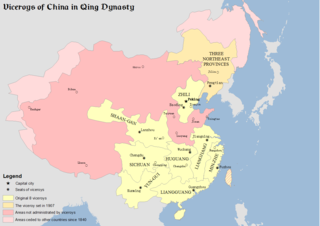
Zhang Jue was the leader of the Yellow Turban Rebellion during the late Eastern Han dynasty of China. He was said to be a follower of Taoism and a sorcerer. His name is sometimes read as Zhang Jiao, since the Chinese character of Zhang's given name can be read as either "Jiao" or "Jue". "Jue" is the traditional reading, while "Jiao" is the modern one.
Taiwanese photography is deeply rooted in the country's unique and rapidly changing history. Its early photography is often divided into two periods: Pre-Japanese from approximately 1858 to 1895, and an Era of Japanese Influence, from 1895 to 1945, the year the Japanese occupation of Taiwan ended. Many photographs from the period during which Taiwan was under Japanese rule have been preserved as postcards. Much of the pre-Japanese era photography was conducted by foreign missionaries and merchants.

Wang Qishan is a Chinese politician, and the current Vice President of the People's Republic of China. Wang is one of the leading figures behind China's foreign affairs, along with Xi Jinping and Li Keqiang. Between 2012 and 2017, Wang had served as the Secretary of the Central Commission for Discipline Inspection, the Communist Party's anti-corruption body, and a member of the Politburo Standing Committee, China's highest decision making body. He was instrumental in carrying out General Secretary Xi Jinping's anti-corruption campaign since 2013.

Qi was a kingdom during the Five Dynasties and Ten Kingdoms period in Chinese history. The kingdom, at its prime, covered parts of modern-day Gansu, Shaanxi, and Sichuan provinces, but eventually shrank to only the immediate area around its capital Fengxiang in Shaanxi. Its only ruler was Li Maozhen, who later submitted to Later Tang.

Fei Yao was a military general of the state of Cao Wei during the Three Kingdoms period of China.

The Empire of China was a short-lived attempt by statesman and general Yuan Shikai from late 1915 to early 1916 to reinstate monarchy in China, with himself as the Hongxian Emperor. The attempt was ultimately a failure; it set back the Chinese republican cause by many years and fractured China into a period of conflict between various local warlords.
The history of the Guqin, an ancient Chinese musical instrument, is a long one that spans 3,000 years. Although similar, it should not be confused with another Chinese zither instrument, the guzheng, which has bridges.

Huang Feihu is a fictional character in the Chinese epic fantasy novel Fengshen Bang. Originally known as Prince Wucheng of the Shang Dynasty, he defects to Xiqi, a vassal state under Shang, after the tyrannical King Zhou of Shang caused the death of his wife. He brings along his two younger brothers, three sons, four close friends, and hundreds of followers loyal to him. Huang Feihu later participates in the campaign led by King Wu of the Zhou Dynasty to overthrow King Zhou of Shang. He is killed in action during a battle against the Shang general Zhang Kui (張奎).

Zhang Chunhui is a Hong Kong football coach and player. He is currently a goalkeeping coach and player for Hong Kong Premier League club Hong Kong Pegasus.

Wu Yiming is a Chinese pair skater. With partner Dong Huibo, he is the 2008 World Junior bronze medalist. He previously competed with An Ni and was a two-time medalist at the Chinese Figure Skating Championships on the senior level.

Qishan County is a county in the west of Shaanxi province, China, under the administration of the prefecture-level city of Baoji. It was the site of Zhouyuan, the first capital of the Zhou Dynasty. Historically, the site was also known as Qiyi (岐邑) or Qishan (岐山). It is located in Fengchu township on the Weishui River to the south of Mt. Qi. Many Zhou-era artifacts including bronzeware have been found here. These are now housed in a museum on the site.
Zhang Shi was the regional warlord and ruler in the Former Liang state. He was the eldest son of Zhang Gui, who was a governor of Liang province under the Jin Dynasty. In 314, Zhang Shi inherited the title Duke of Xiping as well as the governorship of Liang from his father. He was also honored as Prince Ming of Former Liang

Michael Yeung Ming-cheung was the 8th Roman Catholic Bishop of Hong Kong. He was consecrated on 30 August 2014.
Zhang Kunsheng is a former Chinese politician. He was investigated by the Communist Party of China's anti-graft agency in January 2015. Previously he served as Assistant Minister of Foreign Affairs (MFA).
Hou Fengqi is a former Chinese politician who spent most of his career in the cities of Bayannur and Wuhai, in north China's Inner Mongolia. He was investigated by the Communist Party of China's anti-graft agency in November 2015. Previously he served as Communist Party Secretary of Wuhai. In October 2017, he was sentenced to 17 years for accepting bribes and holding a huge amount of property from an unidentified source.
Hanako Ouchi, stage name Hanako (華子) is a Japanese actress, tarento and gravure idol. Her former stage name is Hanako Takigawa.
Tu Men is a Chinese actor. He is known for his portrayals of Genghis Khan in films such as Genghis Khan and An End to Killing. In 2018 he eas at the center of a political dispute after referring to Taiwan as “Taiwan, China” drawing a rebuke from the leader of the Taiwan authorities.

Long Day's Journey into Night is a 2018 Chinese drama film directed by Bi Gan. It was screened in the Un Certain Regard section at the 2018 Cannes Film Festival.
China's New Art, Post-1989 was the first major collection of Chinese experimental art to exhibit outside the country. The exhibition took place between January 30 to February 28, 1993, as part of Hong Kong Arts Festival in Hong Kong City Hall and at Pao Galleries, Hong Kong Arts Centre. The touring exhibition travelled to Taipei, Melbourne, London, Vancouver, and various cities in the USA from 1993 to 1997.














